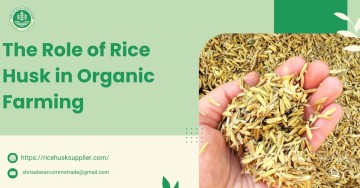


Rice husk can be converted into biochar, a form of charcoal that improves soil quality
Rice husk, an agricultural byproduct obtained after milling rice, has gained prominence in organic farming due to its numerous environmental and agronomic benefits. This seemingly discarded material serves as a valuable resource that enhances soil health, promotes plant growth, and contributes to sustainable agricultural practices. Organic farmers are increasingly incorporating rice husk supplier into their farming methods to improve productivity while maintaining ecological balance.
Rice husk is composed primarily of silica, lignin, and cellulose, which make it an excellent soil amendment. The high silica content (approximately 15–20%) strengthens plant cell walls, increasing resistance to pests and diseases. Additionally, rice husk contains essential nutrients such as potassium, magnesium, and phosphorus, which contribute to soil fertility and plant nutrition. Though it has low nitrogen content, it can be effectively combined with other organic materials to create a well-balanced soil amendment.
One of the primary uses of rice husk in organic farming is as a soil conditioner. When incorporated into the soil, rice husk improves aeration and drainage, reducing the risk of waterlogging and root diseases. Its fibrous nature enhances soil structure, preventing compaction and allowing for better root penetration. Additionally, as rice husk decomposes, it gradually releases nutrients, improving soil fertility over time. The slow decomposition process ensures long-term soil enrichment without causing nutrient leaching.
Rice husk plays a crucial role in water management in organic farming. Its ability to retain moisture helps in reducing water evaporation, especially in sandy or drought-prone soils. When used as mulch, rice husk forms a protective layer that minimizes water loss, regulates soil temperature, and suppresses weed growth. This reduces the need for frequent irrigation, making it an eco-friendly option for farmers practicing water-efficient agriculture.
anaerobic conditions and foul odors. The resulting compost improves soil microbial activity, further enriching the soil with beneficial microorganisms.
The silica content in rice husk strengthens plant cells, making them more resistant to pests and diseases. Additionally, rice husk ash, produced by burning husks, is a natural insect
Rice husk can be converted into biochar, a form of charcoal that improves soil quality. When rice husk undergoes pyrolysis (burning in a low-oxygen environment), it transforms into biochar, which enhances soil fertility, increases carbon sequestration, and improves microbial activity. Biochar also helps in detoxifying soil by binding heavy metals and reducing soil acidity. Its porous structure improves soil aeration and water retention, making it an ideal soil amendment in organic farming.
Rice husk is an invaluable asset in organic farming, offering multiple benefits that enhance soil quality, conserve water, suppress weeds, and support natural pest management. Its versatile applications, ranging from mulching and composting to biochar production and livestock management, make it a crucial component of sustainable agriculture. By utilizing rice husks effectively, organic farmers can improve productivity while maintaining environmental balance, making agriculture more resilient and eco-friendly.
